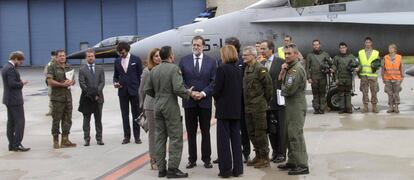Spanish PM defends national security on visit to troops near Russian border
But Rajoy avoids all mention of conflict in Catalonia region over new pro-independence police chief


Spain’s Prime Minister Mariano Rajoy visited the Amari airbase in Estonia on Monday where five Spanish F-18 fighters are stationed as part of a NATO mission to protect the Baltic nation’s airspace in the face of growing pressure from Russia. He made a brief speech connecting Spain and Europe’s security with the mission, but avoided mentioning the mounting conflict with Spain’s northeastern Catalonia region, where the regional government is pressing ahead with plans for an informal referendum on independence for the northeastern region in October.
The decision not to mention Catalonia was far from accidental: the Defense Ministry and the prime minister’s official La Moncloa residence said that the purpose of such visits is to support Spanish troops stationed overseas. During his 30-minute visit to the base, Rajoy highlighted the importance of the country’s armed forces in international missions around the world in guaranteeing the security of Spain by “watching out for all of us,” adding: “More than one million Estonians are safer every day when our fighters patrol.”
Rajoy noted that while Estonia is the NATO member “furthest from Spain” and that “somebody might think that it is far from our interests; I say to them that this is not so and that our security interests are with our allies and in meeting our international commitments.”
Our security interests are with our allies and in meeting our international commitments Spanish Prime Minister Mariano Rajoy
Rajoy did not make any allusions that could be interpreted as referring to internal Spanish matters such as the crisis in Catalonia. However, he would already have known that Albert Batlle, the operative director of the Mossos d’Escuadra, the Catalan regional police force, had resigned because of his opposition to plans for a plebiscite on secession from Spain. Batlle has now been replaced in the force’s top job by the pro-independence figure Pere Soler.
Catalonia’s separatist government is raising the stakes in its challenge to Rajoy, who insists the independence vote breaches the Spanish Constitution. The regional police force will be key to enforcing any court orders sought by the central government challenging regional leader Carles Puigdemont’s bid to hold the secession vote.
NATO members at the January summit in Warsaw agreed a Readiness Action Plan for Poland and the Baltic “to send a clear and unequivocal signal that attacking a NATO member is attacking all.” Spain has sent 313 soldiers and, for the first time abroad, a mechanized tactical subgroup made up of four Leopard tanks, 12 Pizarro infantry fighting vehicles and 11 Oruga armored transport vehicles.
English version by Nick Lyne.
Tu suscripción se está usando en otro dispositivo
¿Quieres añadir otro usuario a tu suscripción?
Si continúas leyendo en este dispositivo, no se podrá leer en el otro.
FlechaTu suscripción se está usando en otro dispositivo y solo puedes acceder a EL PAÍS desde un dispositivo a la vez.
Si quieres compartir tu cuenta, cambia tu suscripción a la modalidad Premium, así podrás añadir otro usuario. Cada uno accederá con su propia cuenta de email, lo que os permitirá personalizar vuestra experiencia en EL PAÍS.
¿Tienes una suscripción de empresa? Accede aquí para contratar más cuentas.
En el caso de no saber quién está usando tu cuenta, te recomendamos cambiar tu contraseña aquí.
Si decides continuar compartiendo tu cuenta, este mensaje se mostrará en tu dispositivo y en el de la otra persona que está usando tu cuenta de forma indefinida, afectando a tu experiencia de lectura. Puedes consultar aquí los términos y condiciones de la suscripción digital.








































